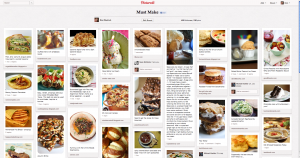 This post is running concurrently on Future Comms.
This post is running concurrently on Future Comms.
On Facebook just after the first of the year, Paul Sutton posted something about not understanding what the big deal is about Pinterest.
It won’t be a surprise to you that I commented. I said something about how he was off his rocker (except I think I was a bit more nice than that).
So he challenged me to a duel.
I’m not at all competitive (hahahaha!!) so I accepted.
See what you think!
The case against, by Paul Sutton
I make no secret of the fact I’m a sceptic when it comes to new social platforms (I’ve been told I have a ‘healthy cynicism’, although I prefer to think I’m pragmatic).
Like everyone else, I’ve read the hype, I’ve signed up, and I’ve watched them come and go. And, to me, Pinterest falls into the same over-hyped category as Quora, Diaspora, and Path.
There’s no doubt Pinterest is different. As a social bookmarking site it’s far more interesting than the likes of Delicious or Diigo, and its visual nature gives it a point of difference. But, for me at least, that’s about it.
I actually WANT to like it as a marketer, but there’s just nothing compelling about it as a realistic long-term option.
Users say part of the appeal of Pinterest is it’s a ‘quiet’ network; there’s none of the mindless drivel and brand intrusion of Facebook, for example.
At some stage, however, it will have to be monetized, probably through advertising or charging brands for profiles.
What happens to the ‘quiet’ then?
I also have concerns over it’s purpose. It says its mission is to “connect people all over the world based on shared tastes and interests.” So that’ll be just like Facebook and every other social network out there then? Using images may be visually appealing but that doesn’t mean it really has a unique selling proposition.
And this last point is where I think it really falls down for marketers. Just like Gini says, users have told me that Pinterest is addictive. But more often than not, that’s countered by a feeling they’re just repeating what they’re doing on other networks with no real purpose.
I’ve read several ‘how to get more out of Pinterest’ type articles, and that itself rings alarm bells for me. The fact that people need to be told why they’re using it suggests they can, and will, get bored within a month or two once the novelty wears off.
The case for, by Gini Dietrich
I’ve been watching Pinterest with great interest for the past few months. It’s not often a new social network comes along that completely captures your attention. You see, 84 percent of us are visual learners. That means we like to look at pictures and watch videos. We need to see something in order for it to sink into our brains. Because of that, I’ve long been a strong advocate of using video in your marketing programs. And then along came Pinterest.
Just like blogging and Twitter and Facebook and Google+, Pinterest started out as a personal obsession. And then, because I can’t turn off my darn marketing brain, I began to see applications for businesses. But what really sold me is when Daniel Gordon, from Samuel Gordon Jewelers in Oklahoma City, began sharing his company’s Pin It contest. All you had to do is pin your favorite jewelry from their website and you were entered into a contest to win Honora Pearls.
What they did is take something really personal (photos of jewelry you like), ask you to pin it to your boards (which makes sharing easier), and they were able to create a viral effect, driving people to their site to eventually buy jewelry.
Do I think there are B2B applications for this? No. Not yet. But if you’re a retailer, in fashion, have a restaurant, or sell anything that is visual, Pinterest is something you definitely should be considering for your 2012 marketing plans.
On the personal side, I’ll admit I may need to go to Pinterest rehab. But it feeds so many of my creative juices I may never have to actually think about what I’m going to fix for dinner or buy someone for their birthday. I have all the inspiration I need on my boards! And, if you’re lazy, you can follow me and steal a bunch of my pins with one click of your mouse.
What do you think?
Cast your vote (so I can officially beat Paul) and leave us both a comment.